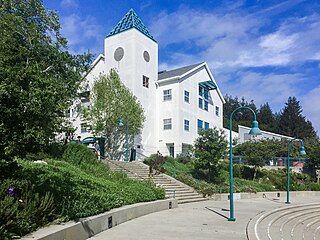
The University of California (UC) is a public land-grant research university system in the U.S. state of California. The system is composed of the campuses at Berkeley, Davis, Irvine, Los Angeles, Merced, Riverside, San Diego, San Francisco, Santa Barbara, and Santa Cruz, along with numerous research centers and academic abroad centers. The system is the state's land-grant university.

The University of California, Santa Cruz is a public land-grant research university in Santa Cruz, California. It is one of the ten campuses in the University of California system. Located on Monterey Bay, on the edge of the coastal community of Santa Cruz, the campus lies on 2,001 acres (810 ha) of rolling, forested hills overlooking the Pacific Ocean.

The American Whig–Cliosophic Society (Whig-Clio) is a political, literary, and debating society at Princeton University and the oldest debate union in the United States. Its precursors, the American Whig Society and the Cliosophic Society, were founded at Princeton in 1769 and 1765 by James Madison, William Paterson, Oliver Ellsworth, and Aaron Burr.

Kresge College is one of the residential colleges that make up the University of California, Santa Cruz. Founded in 1971, Kresge is located on the western edge of the UCSC campus. Kresge is the sixth of ten colleges at UCSC, and originally one of the most experimental. The first provost of Kresge, Bob Edgar, had been strongly influenced by his experience in T-groups run by NTL Institute. He asked a T-group facilitator, psychologist Michael Kahn, to help him start the college. When they arrived at UCSC, they taught a course, Creating Kresge College, in which they and the students in it designed the college. Kresge was a participatory democracy, and students had extraordinary power in the early years. The college was run by two committees: Community Affairs and Academic Affairs. Any faculty member, student or staff member who wanted to be on these committees could be on them. Students' votes counted as much as the faculty or staff. These committees determined the budgets and hiring. They were also run by consensus. Distinguished early faculty members included Gregory Bateson, former husband of Margaret Mead and author of Steps to an Ecology of Mind; Phil Slater, author of The Pursuit of Loneliness; John Grinder, co-founder of Neuro-linguistic programming and co-author of The Structure of Magic; and William Everson, one of the Beat poets.

Benjamin F. Porter College, known colloquially as Porter College, is a residential college at the University of California, Santa Cruz. It is located on the lower west side of the university, south of Kresge College and north of Rachel Carson College. The college was founded in 1969 as College Five and formally dedicated on November 21, 1981. On that day the college was given the motto Ars Longa, Vita Brevis, and a series of college symbols, including a faculty mace and a college bell, were inaugurated.

Crown College is one of the residential colleges that makes up the University of California, Santa Cruz, United States.

Sonoma State University is a public university in Rohnert Park in Sonoma County, California. It is one of the smallest members of the California State University (CSU) system. Sonoma State offers 92 Bachelor's degrees, 19 Master's degrees, and 11 teaching credentials. The university is a Hispanic-serving institution.

California State University Channel Islands is a public university in Ventura County, California. It opened in 2002 as the 23rd campus in the California State University system. CSUCI is located midway between Santa Barbara and Los Angeles near Camarillo, at the intersection of the Oxnard Plain and northernmost edge of the Santa Monica Mountains range. The Channel Islands are nearby where the university operates a scientific research station on Santa Rosa Island.

The first of the ten residential colleges of the University of California, Santa Cruz, established in 1965, Cowell College sits on the edge of a redwood forest with a remarkable view of Monterey Bay. The college is named for Henry Cowell and the Cowell family, who donated the land that UCSC is built upon, previously known as the Cowell Ranch.

Merrill College is a residential college at the University of California, Santa Cruz. The theme of the college, and the name of its freshman core course, is "cultural identities and global consciousness."

Oakes College is a residential college at the University of California, Santa Cruz. It is on the southwestern corner of the campus, south of Rachel Carson College and east of the Family Student Housing complex.

Rachel Carson College is a residential college at the University of California, Santa Cruz. Named in honor of conservationist Rachel Carson, it is on the west side of campus, north of Oakes College and southeast of Porter College. The current provost of the college is Professor Sue Carter, also a faculty member of UCSC's Physics Department. The theme of its freshman core course is Environment and Society.

College Nine is a residential college at the University of California, Santa Cruz. The university's first new college in nearly 30 years, College Nine was founded in 2000 although the dorms were not finished until 2002. It is located on the north side of campus, east of Science Hill and west of Crown College. The college theme is International and Global Perspectives. All freshmen students are required to take a core course on this particular theme.

John R. Lewis College is one of the ten residential colleges at the University of California, Santa Cruz. It is on the north side of campus, west of College Nine and north of the Cowell Student Health Center. The theme of its freshman core course is Social Justice and Community.

Sixth College is the sixth and second-newest college of the University of California, San Diego. It was established in September 2001. Sixth College's core writing program, Culture, Art and Technology (CAT), is a five-course sequence that integrates writing skills into multidisciplinary classes to examine the intersections of culture, art, and technology.

Revelle College is the oldest residential college at the University of California, San Diego in La Jolla, California. Founded in 1964, it is named after oceanographer and UC San Diego founder Roger Revelle. UC San Diego—along with Revelle College—was founded at the height of the Space Race between the United States and the Soviet Union. As a result, the initial class of 181 undergraduates comprised only 30 non-science majors. Revelle College focuses on developing "a well-rounded student who is intellectually skilled and prepared for competition in a complex world."

Thurgood Marshall College (Marshall) is one of the seven undergraduate colleges at the University of California, San Diego. The college, named after Thurgood Marshall, the first African-American Supreme Court Justice and lawyer for the landmark 1954 Supreme Court case Brown v. Board of Education, emphasizes "scholarship, social responsibility and the belief that a liberal arts education must include an understanding of [one's] role in society." Marshall College's general education requirements emphasize the culture of community involvement and multiculturalism; accordingly Marshall houses the minors in Public Service and Film Studies for the campus. Significant academic programs and departments have come out of the college over many decades: Communication, Ethnic Studies, Third World Studies, African American Studies, Urban Studies & Planning, and Education Studies.

The Baskin School of Engineering is the school of engineering at the University of California, Santa Cruz. It consists of six departments: Applied Mathematics, Biomolecular Engineering, Computational Media, Computer Science and Engineering, Electrical and Computer Engineering, and Statistics.
Adlai Stevenson may refer to:
Stony Brook University is the largest residential campus in the State University of New York system, with approximately 54.5% of its students living on campus. Housing at Stony Brook is issued and controlled by Stony Brook University Campus Residences, which provides 9,445 spaces in its 11 corridor style buildings, 19 suite style buildings, and 23 apartment style buildings to Undergraduate students, Graduate students, and students' families. The large majority of on-campus housing is provided to students on the university's west campus, but housing is available to those on east campus, and for Stony Brook Southampton students.
City On a Hill Press. Jan 2009 ed.


















